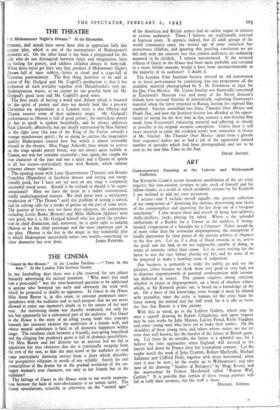THE THEATRE PROSAIC, dull minds have never been able to
appreciate fully this unique play, which is one of the masterpieces of Shakespeare's dramatic art. On the other hand it has been a playground for the silly who do not distinguish between fancy and imagination, have no feeling for poetry, and address children always in baby-talk. When these latter get their way they produce A Midsummer Night's Dream full of tame rabbits, fairies in tinsel and a stage-full of Victorian pantomimery. The first thing therefore to be said in praise of Mr. Gielgud and Mr. Coghill's production is that it has eschewed all such triviality together with Mendelssohn's very un- Shakespearean music, so we cannot be too grateful both for Mr. Gielgud's good taste and Mr. Coghill's good sense.
The first result of having a wood near Athens which is haunted by the spirit of poetry and does not merely look like a pre-war Christmas toy department at a London store is that Oberon and Titania recover some of their authentic magic. Mr. Gielgud's performance as Oberon is full of good points ; the marvellous poetry he has to speak is spoken beautifully, and he always addresses Puck (cleverly, effectively, but not ideally represented by Max Adrian) in the right tone (the tone of the King of the Fairies towards a strange mischievous spirit) ; by so doing he catches the imaginative quality Shakespeare created here but which is almost invariably missed in the theatre. Miss Peggy Ashcroft, than whom no actress on the stage speaks poetry better, was not always quite audible as Titania, nor was her costume successful ; but, again, she caught the true character of the part and was a spirit and a Queen of spirits in all her scenes—particularly those with Bottom, which inferior actresses always vulgarise.
The opening scene with Leon Quartermaine (Theseus) and Rosalie Crutchley (Hippolyta) in Jacobean dresses and setting was excep- tionally good, but I have not yet seen on any stage a completely successful wood scene. Should it be stylised or should it be repre- sentational? Here we have the latter in a rather conventional, totally undistinguished manner. We shall never have a satisfactory production of " The Dream" until this problem of setting is solved, and its solving calls for a stroke of genius on the part of some artist. The quartet of lovers was not more than adequate, the journeymen Including Leslie Banks (Bottom) and Miles Malleson (Quince) were very good, but it is Mr. Gielgud himself who has given the produc- tion its chief distinction, and, moreover, he is quite right in judging Oberon to be the chief personage and the most important part in the play. Oberon is the key to the magic in this wonderful play in which Shakespeare successfully unites two worlds—something no


























 Previous page
Previous page